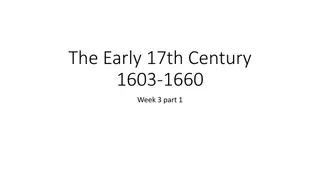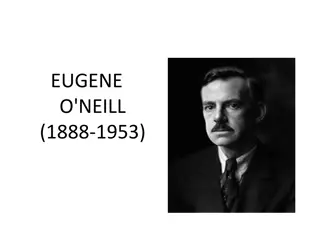Benjamin Jonson: Playwright and Poet Extraordinaire
Benjamin Jonson, a prominent playwright and poet, lived from 1572 to 1637. He gained fame for works like "Every Man in His Humour" and became a favorite of King James I. Jonson had a challenging family life, with tragedies surrounding his children. Despite facing imprisonment, his career flourished, and he left a significant impact on English literature.
Download Presentation

Please find below an Image/Link to download the presentation.
The content on the website is provided AS IS for your information and personal use only. It may not be sold, licensed, or shared on other websites without obtaining consent from the author.If you encounter any issues during the download, it is possible that the publisher has removed the file from their server.
You are allowed to download the files provided on this website for personal or commercial use, subject to the condition that they are used lawfully. All files are the property of their respective owners.
The content on the website is provided AS IS for your information and personal use only. It may not be sold, licensed, or shared on other websites without obtaining consent from the author.
E N D
Presentation Transcript
Benjamin Jonson By: Zaid Khan
Biography Lived from 1572-1637 (died at 65 years old) Born on approximately June 11, 1572 in London After a stint in the army, he established himself as an actor and playwright His first major success was Every Man In His Humour (1598). Went on to become a favorite of King James I, who may have made him poet laureate. Other plays include Volpone (1605), The Alchemist (1610) and Bartholomew Fair (1614).
Family Jonson's clergyman father died two months before his birth; his mother married a master bricklayer two years later. Jonson described his wife as a shrew, yet honest . Since the seventeenth century, the identity of Jonson's wife has been obscure, yet she sometimes is identified as Ann Lewis . The St. Martin church registers indicate that Mary Jonson, their eldest daughter, died in November 1593, at six months of age. Then a decade later, in 1603, Benjamin Jonson, their eldest son, died of Bubonic plague when he was seven years old. Moreover, thirty-two years later, a second son, also named Benjamin Jonson, died in 1635
Education A family friend paid for his studies at Westminster School, William Camden (1551 1623) was one of his masters. The intellectual influence of Camden's scholarship upon Jonson's art and literary style remained notable until Camden's death. Jonson was supposed attend the University of Cambridge, to continue his book learning; but did not, because of his unwilled apprenticeship to his bricklayer stepfather.
Military After having been an apprentice bricklayer, Ben Jonson went to Netherlands, and volunteered to soldier with the English regiments of Francis Vere (1560 1609), in Flanders. Conversations between Ben Jonson and the poet William Drummond (1585 1649), report that, Jonson engaged, fought, and killed an enemy soldier in single combat, and took for trophies the weapons of the vanquished soldier. After his military activity, Jonson returned to England and worked as an actor and as a playwright.
Career & Life By 1597 Jonson had begun to write original plays for the Admiral's Men In 1597 a play which he co-wrote with Thomas Nashe, The Isle of Dogs, was suppressed after causing great offense. Arrest warrants for Jonson and Nashe were issued by Queen Elizabeth I. Jonson was jailed and charged with "Leude and mutynous behavior", while Nashe managed to escape.
Career & Life (cont.) A year later, Jonson was again briefly imprisoned, this time for killing a man by the name of Gabriel Spenser in a duel. In 1598 Jonson produced his first great success, Every Man in His Humour, William Shakespeare was among the first actors to be cast Jonson's other work for the theatre in the last years of Elizabeth I's reign was marked by fighting and controversy Jonson's production began to decline in the 1620s Jonson died on 6 August 1637























